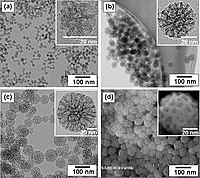
Photo from wikipedia
Millimeter-wave (mmWave) communication is envisioned to provide orders of magnitude capacity improvement. However, it is challenging to realize a sufficient link margin due to high path loss and blockages. To… Click to show full abstract
Millimeter-wave (mmWave) communication is envisioned to provide orders of magnitude capacity improvement. However, it is challenging to realize a sufficient link margin due to high path loss and blockages. To address this difficulty, in this paper, we explore the potential gain of ultra-densification for enhancing mmWave communications from a network-level perspective. By deploying the mmWave base stations (BSs) in an extremely dense and amorphous fashion, the access distance is reduced and the choice of serving BSs is enriched for each user, which are intuitively effective for mitigating the propagation loss and blockages. Nevertheless, co-channel interference under this model will become a performance-limiting factor. To solve this problem, we propose a large-scale channel state information (CSI)-based interference coordination approach. Note that the large-scale CSI is highly location-dependent, and can be obtained with a quite low cost. Thus, the scalability of the proposed coordination framework can be guaranteed. Particularly, using only the large-scale CSI of interference links, a coordinated frequency resource block allocation problem is formulated for maximizing the minimum achievable rate of the users, which is uncovered to be an NP-hard integer programming problem. To circumvent this difficulty, a greedy scheme with polynomial-time complexity is proposed by adopting the bisection method and linear integer programming tools. Simulation results demonstrate that the proposed coordination scheme based on large-scale CSI only can still offer substantial gains over the existing methods. Moreover, although the proposed scheme is only guaranteed to converge to a local optimum, it performs well in terms of both user fairness and system efficiency.
Journal Title: IEEE Journal on Selected Areas in Communications
Year Published: 2017
Link to full text (if available)
Share on Social Media: Sign Up to like & get
recommendations!